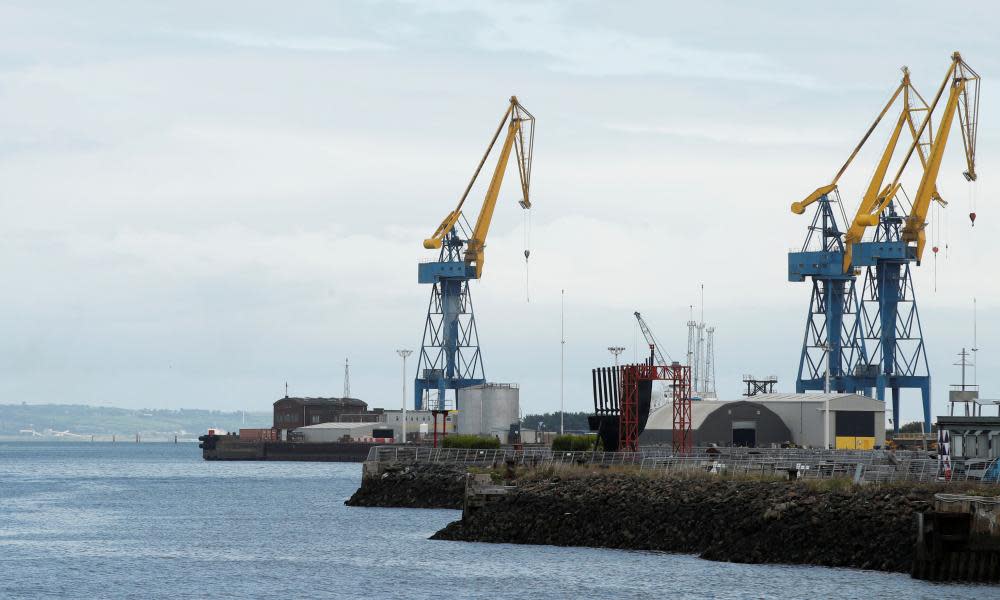The 'Irish Sea border': what does it mean for businesses?

In agreeing a deal to guarantee the Irish border remains invisible, with no checks fuelling inter-community tensions, the UK is moving the border to the Irish Sea.
But the Democratic Unionist party (DUP) fears it will create an unwelcome new Brexit burden in Great Britain, forcing manufacturers to take on a mountain of paperwork and breaching Theresa May’s promise that east-west trade would remain unfettered.
Related: The DUP knows it will have to carry the burden of Brexit | Katy Hayward
While the DUP softened its previous opposition to such an outcome, Sammy Wilson, the MP for East Antrim, raised concerns about the impact facilitating Boris Johnson’s new deal would have on businesses exporting from Great Britain to Northern Ireland.
Why is a barrier in the Irish Sea being discussed?
If all goods entering the island of Ireland are checked before arrival for standards and tariffs, then cross-border trade can continue to flow unimpeded.
It will also protect the single market and reduce the chance of suspect goods making their way to the continent via Northern Ireland and the republic.
But will it create barriers between Great Britain and Northern Ireland?
Yes, but the DUP has accepted that regulatory alignment with the EU on goods and agrifood will help keep the Irish border open and maintain peace.
How much trade goes from Great Britain to Northern Ireland anyway?
Around 450,000 trailers arrive in Northern Ireland every year, transporting everything from cars to soft cheese to school shirts.
Trade and services purchased from Great Britain were valued at £13.4bn according to the latest data, £11bn of that representing goods.
About 70% of goods purchased by Northern Irish businesses from Great Britain are destined for the high street and are largely food to Tesco, Sainsbury’s and other supermarkets, clothing and white goods, cars and motorbikes.
Who will the new Brexit terms impact?
All companies moving goods to Northern Ireland. Business representatives believe the big companies such as supermarket chains will be able to put systems in place to deal with any checks but will be looking for government assistance to help smaller businesses.
Will there be a border through the Irish Sea immediately if parliament votes for a deal?
No. The discussion over the Irish border is part of Boris Johnson’s alternative arrangements to the controversial backstop. It will only be triggered if the UK and EU do not seal their main trade deal before the end of the transition period.
What kind of checks will be made?
The extent and type of checks will not be clear until the detail of the deal emerges, but essentially they fall into two categories: tariffs and VAT. Excise duties also apply but will not trouble most importers as they generally apply to a limited amount of controlled goods including alcohol, cigarettes and fuel.
Who will be required to have their goods checked?
Customs declarations apply for both exports and imports and, although the trade is domestic, for the purposes of this version of a Brexit backstop, the checks will be made on behalf of the EU. It is concerned about goods from a third country leaking into Ireland and therefore the single market.
What will businesses selling to Northern Ireland have to do?
Exporters from Great Britain will be required to fill out complicated customs declaration forms. Anna Jerzewska, an independent customs consultant, says each form has 50 fields and, according to government estimates last week, will take 1 hour and 45 minutes to complete.
Each business will have to establish all its commodity codes, a 10-digit number unique to each product that determines the precise tariff applicable.
Using school shirts as an example, the code will vary according to the components in the shirt: whether the shirt is of knitted fabric, cotton, whether it has sleeves, pockets, whether the overlap at the front is right over left or left over right.
“All these commodity codes have to be exact and if you get it wrong you could be committing an offence,” said Jerzewska. “People will have to find that code and that will be a challenge. Imagine if you had to find the commodity code for your laptop. Where would you even start?”
What happens when the goods arrive in Belfast?
The “buyer” or importer will have to pay an EU tariff. This is likely to be collected on behalf of the EU by UK officials, although in time it is likely to be an electronic transaction.
What happens if the importer is also selling that shirt to schools in Dublin?
There will not be any check on the box of shirts as it crosses the border, but the importer will not get a rebate on this consignment if it is sold in Dublin.
Will getting a rebate be easy?
It is not clear how the government intends to proceed with the tariff arrangements but if it works like the Dover-Calais system it will not be easy.
There is no system set up for a seamless tariff pay and refund system that will be the success or failure at the heart of the new Irish backstop. Currently the EU operates a streamlined refund system for VAT known as VIES (VAT information exchange system) across Europe.
There is nothing similar for tariffs, leaving retailers and traders concerned. “People won’t want to pay tariffs upfront and then wait weeks for a refund because it will kill your working capital. It will have to be a seamless invisible transaction,” said Aodhán Connolly, the director of the Northern Ireland Retail Consortium.

 Yahoo News
Yahoo News 
